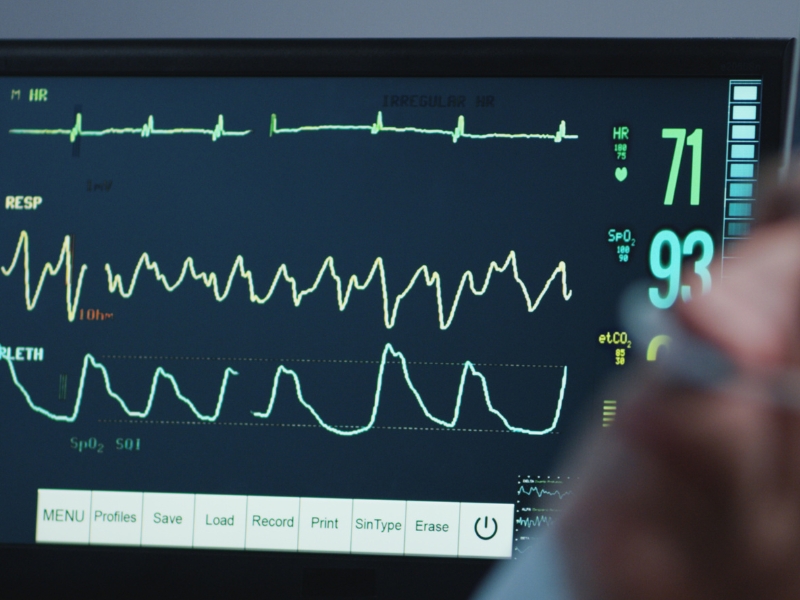
A healthy heart with an adequate supply of Coenzyme Q10 pumps out sufficient amounts of blood with every heartbeat. Increasing age, taking statin medications, plant-based diets, and certain disease conditions reduce the supply of Coenzyme Q10 available to the heart muscle cells.
Patients with chronic heart failure are patients whose heart does not pump out enough blood with each heartbeat. The failing heart has to work harder and harder – has to pump more times per minute – to pump enough blood containing oxygen and nutrients out to the body tissues. The failing heart is an energy-deprived heart. It is a heart with contractions that are not as strong as they need to be.
The symptoms of chronic heart failure
Cardiologists have categorized some of the most common symptoms of heart failure in its earlier stages:
- Shortness of breath (called dyspnea in the medical literature) during or following ordinary amounts of physical exertion
- Fatigue and weakness (muscle weakness is called myopathy) following ordinary amounts of physical exertion
- Swelling (called edema) in the lower extremities
- Reduced ability to walk or exercise
- Difficulty concentrating
Causes of chronic heart failure
There are many possible causes of chronic heart failure, but, essentially, what heart failure comes down to is a thickening and stiffness in the muscles of the left ventricle of the heart. The left ventricle is the ventricle that pumps the blood out to the aorta, which is the main artery that carries the blood from the heart out to the body.
Coenzyme Q10 makes the heart’s contractions stronger
Numerous studies conducted over the past 30 years have yielded the following conclusions about chronic heart failure:
- There is an established strong inverse association between the levels of Coenzyme Q10 in the blood and tissues and the severity of chronic heart failure – the lower the blood or tissues levels of Coenzyme Q10, the greater the severity of the heart failure
- Coenzyme Q10 is a known essential cofactor in the process of energy production at the cellular level
- Dysfunction of the cellular process of bioenergetics in the heart muscle is an important mechanism by which the heart’s contractions become less and less powerful
- The human body does produce Coenzyme Q10, but the production generally peaks in a person’s 20s and then begins to decrease with increasing age.
- The taking of statin medications greatly reduces the body’s own production of Coenzyme Q10
- Supplementation with Coenzyme Q10 in addition to conventional medication can lead to increased energy production in the failing heart
Digoxin as an inotropic agent
A positive inotrope is a medication that strengthens the contractions of the heart muscle. The best known positive inotrope is the one called digoxin.
Digoxin strengthens the force of the heart’s contractions by increasing the amount of calcium in the heart’s cells. The increased presence of the calcium stimulates the heart to contract more forcefully.
But digoxin use needs to be monitored very carefully. Its use is safe only within relatively narrow limits. Chronic digoxin toxicity is an ever present danger. Such factors as decreased kidney function, dehydration, disturbances in electrolyte balances, or some drug interactions can make the use of digoxin dangerous.
Coenzyme Q10 as a safe indirect positive inotrope
Coenzyme Q10 supplement is known to be very safe. The safe upper limit for the ingestion of Coenzyme Q10 is thought to be 1200 mg per day.
In the Q-Symbio study, 300 mg per day (taken as 100 mg three times daily) was safe and well-tolerated and effective at improving the symptoms and survival of heart failure patients.
Adjuvant treatment with Coenzyme Q10
In other words, adjuvant treatment with Coenzyme Q10 has been seen to work as an indirect positive inotrope. Adequate supplies of Coenzyme Q10 are needed in the cells of the heart muscle tissue. The Coenzyme Q10 is needed to produce the energy that helps the heart muscle contract.
The side effects of statin medications
By now, I hope that everyone is aware of one adverse side effect of taking statin medications. The mechanism by which statin medications work to inhibit the body’s production of cholesterol – by inhibiting the functioning of the HMG-CoA reductase enzymes – is the same mechanism that inhibits the body’s production of Coenzyme Q10.
It now seems that, in reducing the amount of cholesterol in the body in the hope of reducing the extent of atherosclerosis — the build-up of plaques of fatty materials on the inner walls of the arteries – and reducing the risk of heart attack, we have reduced the supply of Coenzyme Q10 to the heart muscle cells and have increased the risk of worsening heart failure.
How Coenzyme Q10 helps the heart failure patient
In addition to improving the energy production in the heart muscle cells, supplementation with Coenzyme Q10 is thought to provide other health benefits:
- Coenzyme Q10 serves as a powerful antioxidant neutralizing harmful free radicals caused by oxidative stress in the heart muscle
- Coenzyme Q10 improves endothelial function, helping to maintain a balance between the vaso-dilating and vaso-constricting substances acting on the endothelium (the endothelium is composed of the cells lining the inside of the blood vessels)
- Coenzyme Q10 can impede the metabolic vicious cycle in a beneficial way (the metabolic vicious cycle involves the low cardiac output of heart failure leading to compensatory hormonal excitation leading to increases in the fatty acid concentrations in plasma leading to the delivery of more plasma fatty acids to the heart muscle cells and then to the mitochondria where the fatty acids disrupt the mitochondrial respiration process, which results in less powerful contractions of the heart, thus starting the cycle all over again.)
- Coenzyme Q10 may help stabilize the mitochondrial permeability transition pore (destabilization of the MPTP by calcium overload in the mitochondria together with oxidative stress results in ATP depletion and cell injury or death)
- Coenzyme Q10 therapy may shield the heart muscle cells against apoptosis (programmed cell death)
Clinical effects of Coenzyme Q10 supplementation
Supplementation with Coenzyme Q10 capsules, as compared to supplementation with placebo capsules, brings about the following statistically significant and clinically relevant positive outcomes in heart failure patients:
- Fewer cardiovascular deaths
- Fewer major cardiovascular events
- Fewer hospitalizations
- Fewer all-cause deaths
Read our key article on CoQ10 as adjuvant therapy for heart failure
Sources:
Mortensen, S. A., Rosenfeldt, F., Kumar, A., Dolliner, P., Filipiak, K. J., Pella, D., & Littarru, G. P. (2014). The effect of coenzyme Q10 on morbidity and mortality in chronic heart failure: results from Q-SYMBIO: a randomized double-blind trial. JACC. Heart Failure, 2(6), 641-649.
Okuyama, H., Langsjoen, P. H., Hamazaki, T., Ogushi, Y., Hama, R., Kobayashi, T., & Uchino, H. (2015). Statins stimulate atherosclerosis and heart failure: pharmacological mechanisms. Expert Review of Clinical Pharmacology, 8(2), 189-199.









Dear sir madame Iam currently on warafin 3a half mg a digoxin 62.5 mg a dilatrend 6.25 mg..Is it fine to take CoEnzyme Q10 150mg with my current medications?
Dear Barry,
You will want to consult with the physician who has prescribed your warfarin medication and who is monitoring its effect.
You may want to refer the physician to the following randomized controlled trial.
Engelsen, J., Nielsen, J. D., & Winther, K. (2002). Effect of coenzyme Q10 and Ginkgo biloba on warfarin dosage in stable, long-term warfarin treated outpatients. A randomised, double blind, placebo-crossover trial. Thrombosis and Haemostasis, 87(6), 1075-1076.
That study indicated that Coenzyme Q10 does not influence the clinical effect of warfarin.
But, definitely, talk to your physician before starting on CoQ10 supplements.
And remember, not all CoQ10 supplements are equally good. A good formulation is very important.
Thank you,
Richard